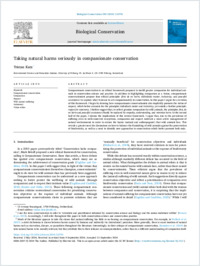Taking natural harms seriously in compassionate conservation
DOKPE
- Katz, Tristan ORCID University of Fribourg
- 2024
Published in:
- Biological Conservation. - USA : Elsevier BV. - 2024, vol. 299, no. art. 110791, p. 1-9
English
Compassionate conservation is an ethical framework proposed to instill greater compassion for individual animals in conservation science and practice. In addition to highlighting compassion as a virtue, compassionate conservationists propose four ethical principles (first do no harm, individuals matter, inclusivity, and peaceful coexistence) to capture what it means to act compassionately in conservation. In this paper I argue for a revision of this framework. I begin by showing how compassionate conservationists also implicitly promote the virtue of respect, which better accounts for the principles individuals matter and inclusivity, yet entails a further principle: respect for autonomy. I further suggest that, to reflect genuine compassion for wild animals, the principles first, do no harm and peaceful coexistence should be replaced by empathy, understanding, and minimize harm. In the second half of the paper, I discuss the implications of this revised framework. I argue that, due to the prevalence of suffering even in well-conserved ecosystems, compassion and respect motivate a more active management of natural environments in order to reduce the harms (natural and anthropogenic) that wild animals face. This reveals a greater need for discussions on how to balance the flourishing of wild animals against the preservation of biodiversity, as well as a need to identify new approaches to conservation which better promote both ends.
- Faculty
- Faculté des sciences et de médecine
- Department
- Département de Géosciences
- Language
-
- English
- Classification
- Ecology and biodeversity
- License
- Open access status
- hybrid
- Identifiers
-
- DOI 10.1016/j.biocon.2024.110791
- ISSN 0006-3207
- ISSN 1873-2917
- Persistent URL
- https://folia.unifr.ch/unifr/documents/329494
Statistics
Document views: 73
File downloads:
- katz_2024_takingnaturalharmsseriouslyincompassionateconservation: 137
